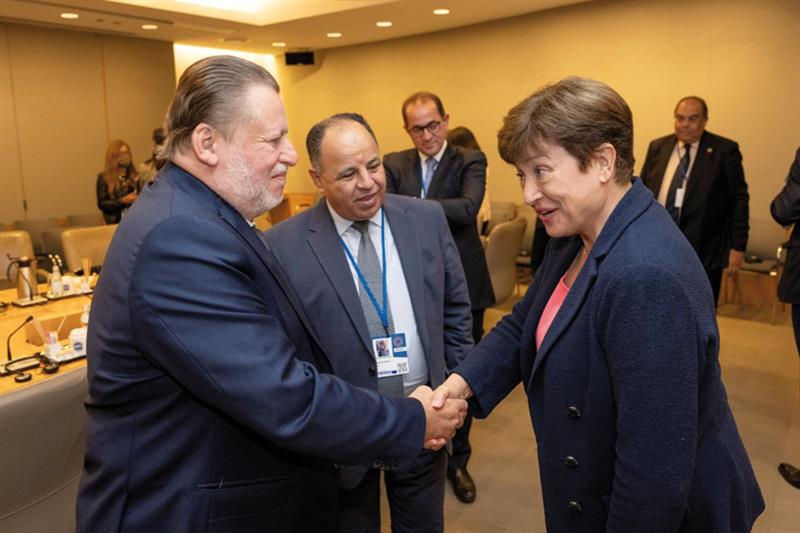
Egypt is patiently waiting for the International Monetary Fund (IMF) to approve a new emergency loan. Yet, the IMF staff asked for more structural and economic reforms before approving the loan. After seven months of negotiations, the loan’s amount and release date are still unclear.
Egypt is shooting for a loan as big as US$6 billion, urgently needed to handle the consequences of the Russia-Ukraine war on the domestic economy. However, experts say that the IMF’s new loan to Egypt, if eventually approved, may not exceed 3 or 4 billion dollars. This is the fourth loan request submitted by Egypt during the past seven years.
Egypt is the second-largest debtor by amount from the IMF, after Argentina. Previous Egypt deals with the IMF, under the current political leadership of President El-Sisi, are US$12 billion over four years, released in 2016, and two separate deals of US$2.72 billion and US$5.2 billion, released in 2020, to counter the consequences of the pandemic.
Tunisia and Egypt, among 28 countries, have been knocking on the doors of the International Monetary Fund (IMF) for an emergency loan to bail their economies out of the consequences of the Russia-Ukraine war. Last week, senior officials from both countries held separate meetings with the IMF and the World Bank work teams in Washington to discuss their proposed macroeconomic reform policies that justify the release of the IMF loans.
After the meetings, the Tunisian government successfully secured a loan of 1.9 billion dollars over 48 months from the IMF. Meanwhile, the Egyptian officials returned home empty-handed. The IMF staff said further work needs to be completed by Egypt to “reach a Staff-Level Agreement very soon.” The Staff-Level Agreement is a necessary first step wherein the loan amount and the attached macroeconomic reform policies are decided.
This scene is very reminiscent of what happened in the Spring of 2013 when the IMF approved a loan of 1.7 billion dollars for Tunisia and postponed Egypt’s loan request for further discussions. Experts justified the IMF decision, at that time, by referring to Egypt’s low foreign currency reserves and the state of political instability caused by people's rejection of the Muslim Brotherhood rule.
Ironically, this can also be said about the case inside Tunisia today. Tunisia has been shaking for more than a year under severe political turmoil caused by President Saied’s forced grab of power. The existing Egyptian state is way more stable than the Tunisian state.
The Egyptian government has been trying for months to convince the IMF of Egypt’s readiness to receive the loan. The governmental efforts, in that regard, have extended from lobbying at the IMF and World Bank decision-making bureaus to adopting new economic and political policies. That includes, for example, the new government plan to withdraw the state from market competition and avail bigger space for private sector businesses.
A few months ago, the Egyptian Prime Minister announced an ambitious plan of macroeconomic reform that will open the Egyptian market to private investors and startup entrepreneurs. The government aims, through this program, to secure a total of US$40 billion in direct investments over the coming four years.
In addition, an urgent cabinet reshuffle was made in August, followed by a sudden change in the leadership of the Central Bank of Egypt (CBE). However, the unexpected change in the CBE leadership has, probably, contributed to the delay in the IMF decision on the loan. One lesson learnt from political history and experience is that the change in negotiators’ faces usually impacts the course of negotiations. IMF Managing Director, Kristalina Georgieva, hinted at the issue by saying that the new CBE governor needs to “feel comfortable with where we are headed with the policy.”
“Additional fiscal and related structural policies that would further expand the social safety net for the most vulnerable, improve the budget composition, and enhance fiscal transparency;” explained the IMF in a press statement following meetings with Egyptian officials, who are leading the state economic portfolio. “Monetary and exchange rate policies that would anchor inflation expectations, improve monetary policy transmission, improve the functioning of the foreign exchange market, and bolster Egypt’s external resilience.”
The IMF is concerned about Egypt’s ability to sustain foreign reserves. Egypt relies on Arab Gulf countries feeding the CBE with medium to long-term deposits in US dollars. That is in addition to the remittances of the Egyptians living and working abroad. However, the high expenses on importation make it difficult for Egypt to keep foreign reserves at a stable high.
Nevertheless, the most important policy reform that the IMF is looking for is improving market competitiveness. The IMF statement mentioned very clearly that “the implementation of the authorities’ comprehensive structural reform agenda would gradually enhance the competitiveness of the economy, reduce the role of the state in the economy, level the playing field for the private sector, improve the business climate, and foster transition towards a greener economy.”
Later this month, the cabinet will hold an economic conference that is expected to stir productive discussions between the government and the business community about the future of Egyptian market competitiveness after state withdrawal. Let’s hope that the outcomes of this conference will lead to a better understanding between the Egyptian government and the IMF staff.
Also, read on Sada Elbalad

Comments